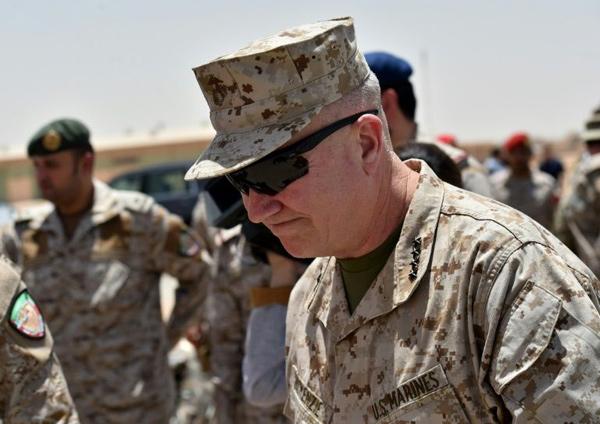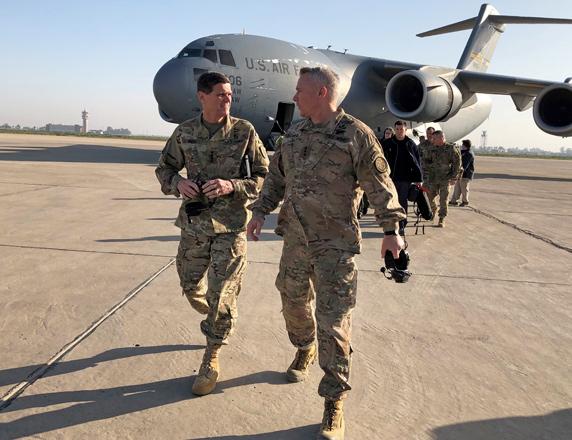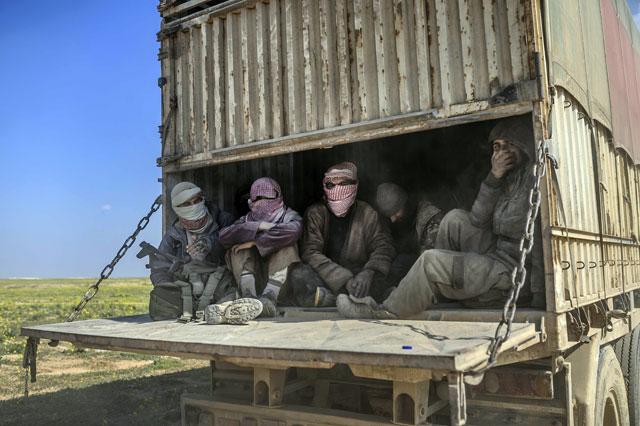You are here
US army chief for Mideast in first visit to northern Syria
By AFP - Jul 23,2019 - Last updated at Jul 23,2019

General Kenneth McKenzie, photographed here in Saudi Arabia, oversees US operations in the Middle East (AFP photo)
QAMISHLI, Syria — US Central Command chief General Kenneth McKenzie on Monday visited Kurdish-led allies in northern Syria for the first time since taking up the post.
McKenzie — who oversees US operations in the Middle East — succeeded General Joseph Votel in late March.
Votel's departure came just days after the Kurdish-led Syrian Democratic Forces (SDF) recaptured the last patch of territory from the Daesh group in eastern Syria with US support.
After the months-long campaign, Syria's Kurds now hold thousands of IS suspects in jails and tens of thousands of women and children in overcrowded camps for the displaced in parts of north and northeastern Syria that they control.
They have repeatedly urged foreign nations to repatriate around 1,000 alleged foreign fighters and tens of thousands of non-Syrian women and children linked to the group, but most countries have been reluctant.
During his visit, McKenzie and SDF chief Mazlum Abdi discussed “the problem of camps and Daesh detainees held by the SDF”, the Kurdish-led alliance said in a statement.
They also spoke of coordination between the US-led coalition and the SDF to carry on hunting down Daesh sleeper cells, it said.
The extremist group has continued to claim deadly car bombings and arson attacks on key wheat fields in SDF-held territory, despite its territorial defeat.
SDF spokesman Mustefa Bali told AFP the meeting had taken place in Kobane, on Syria's northern border with Turkey and from which Kurdish forces drove out Daesh in January 2015.
He posted a photo on Twitter of both commanders shaking hands.
“Several important issues including proposed safe zone, future cooperation between the SDF and anti-ISIS [Daesh] coalition and situation of terrorists and their families were discussed,” he quoted Abdi as saying, using an alternative acronym for Daesh.
US President Donald Trump last year threatened to withdraw all US troops from northeast Syria, sparking fears among Kurds they would be exposed to a long-threatened Turkish attack.
After his announcement, Trump attempted to ease tensions by speaking of a 30-kilometre “safe zone” on the Syrian side of the border.
A small number of American soldiers remain in northeast Syria and Washington has pushed for increased military support from other coalition members.
Mackenzie said Monday that numbers had been reduced “considerably” but did not share exact numbers.
“The key thing right now is to make sure that local security is established so that we can prevent the resurgence of ISIS [Daesh],” he told the local North Press Agency.
“We're going to help them to do that, and then our plan's going to be to leave,”he said, without giving a specific timeframe.
Related Articles
BAGHDAD — The general overseeing US forces in the Middle East flew into Iraq on Sunday for talks with US and Iraqi officials
HASAKEH — Turkish bombardment has damaged more than half of Kurdish-held northeast Syria's power and oil infrastructure, dealing a blow to i
NEAR BAGHOUZ, Syria — Daesh looked close to defeat in its last enclave in eastern Syria on Wednesday as civilians poured out and the US-back

















